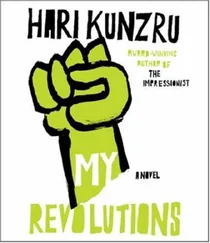Little by little, the place came together. The trailer was hot as all hell and he was trying to work out some way to utilize the shade of the rocks when he found the prospector’s burrow. Didn’t know what it was until he asked at the bar in town. Concreted over a few years previous when they flushed the old bastard out, some story about thinking he was a German spy. Crazy as a coot he may have been, probably starving to death since there wasn’t a cent of silver or anything else on his so-called claim, but he knew how to dig. A whole room, four hundred square feet, right under the rocks. Cool in summer, insulated against the winter nights. A goddamn bunker.
After that it was all gravy. He graded an airstrip, sunk a gas tank into the dirt, threw up a cinder-block shelter and painted WELCOME in big white letters on the tin roof. Now he had a business. The café was never going to amount to much, but then he didn’t need it to be General Motors. He felt he could have gotten along without another living soul, but his savings weren’t going to last forever. He had another year, perhaps two, before money got tight, just about the right time for an enterprise like that to find its feet.
There weren’t too many passing aircraft. About once a week someone would land. He’d serve them coffee, fry eggs. When they asked what he was doing out there he’d say just waiting, and when they asked what for he’d say he didn’t know yet but it sure beat sitting in traffic, and that was usually enough for them. He’d never take visitors down into the bunker. After a few months the numbers increased. Pilots flying to and from the coast began to hear there was a place to refuel. He bought some chairs and Formica-top tables, laid in a stock of beer.
There were problems, of course. His generator broke down. There was a confrontation with some Indians he caught clambering about on the rocks, had to show them his shotgun. After they went away he found rock drawings up there, handprints and snakes and bighorn sheep. Another day a dust storm forced a plane down. The wind was blowing sideways across the strip at fifty miles an hour and the pilot did well to land at all — looked like it would pick up his left wing and flip him as he made his approach. Schmidt ran out to meet him, holding a bandanna over his mouth. Without thinking he took him underground, the logical place to shelter.
The pilot was a young buck, twenty-one or so, head of dark hair, little dandyish mustache. Rich kid. As he stripped off his jacket and goggles, he looked around in wonder, asked where on earth he was.
By that time the project was well advanced. Schmidt had built a vortical condenser to store and concentrate the paraphysical energies flowing through the rocks. A crystal was set into a gimbal on the tip of the tallest stack, angled toward Venus. He was developing a parallel piezoelectric system, based on his study of Tesla, but for now was sending signals using an old Morse key, with an aetheric converter to transform the physical clicks into modulations of the paraphysical carrier wave. He explained all this to the pilot, who listened intently, taking in the machinery, the piles of books and notes. He seemed impressed.
“And what message are you sending?”
There was a question. Schmidt’s message was love. Love and brotherhood to all beings in the galaxy. Two hours of redemption nightly, starting soon as the planet was visible over the horizon. Two hours of repeating his invitation: WELCOME. He didn’t want to talk about it, not with a stranger, made some joke about higher powers, more things than were visible to the naked eye.
The pilot smiled. “Hope you know what you’re doing.”
“We’ll see, I suppose.”
From then on the kid would land his Cub at the Pinnacles every couple of weeks. His daddy was some big farmer down in Imperial Valley, but Davis, that was his name, wanted more out of life than orange groves and wetback pickers. Though Schmidt didn’t ask for a thing, he gave him money to buy books and equipment. Clark Davis was the first disciple, the first to understand the true nature of Schmidt’s calling.
One night they flew over the Nevada state line, touched down at a ranch near Pahrump, a property with neon beer signs in the windows and a row of semis parked out front. Davis wanted to show him a good time, said it wasn’t normal to be on his own so much. Against his better judgment — the whole escapade was against his better judgment — Schmidt found himself sitting nervously, drink in hand, as the girls lined up in their silky nothings, pouting and sticking out their behinds. Davis acted all man-of-the-world, choosing a big-titted greaser and winking encouragingly as he followed her out, like Schmidt was some nervous teenager getting his dick wet for the first time. That got his back up. He downed his brandy, asked for another. He hadn’t touched alcohol since that last night with Lizzie and soon he remembered why; though the little blonde scrap he chose was cute and gentle as could be, he just felt angry at her, at himself, really, and she must have gotten scared and pressed a button or something because before too long he was outside with his pants in his hands, hunting for his other boot in the parking lot.
He tried to explain it to Davis. How he’d been a wild boy, too much for his broke-down mother. How he didn’t care to know about school or a trade, just wanted a big canvas for his young life and air that didn’t taste of sulfur, so he hopped a freight and never once looked back at the smokestacks of Erie, Pennsylvania. By seventeen he was working the line at a salmon cannery in Bristol Bay, spending his pay in the bars and getting himself into every kind of trouble, which eventually added up to Lizzie, who was all of fourteen years old, half-blood native and crazier than he was. Took him in her mouth in the doorway of a warehouse on the docks and it was like a band started playing inside his skull. Before too long she was pregnant and then he really was in the shit because she had brothers and her father was some town big shot, more or less dragged the two of them to church just to save the family reputation. The old man hated Schmidt’s guts for obvious reasons but to do him justice he tried to be decent, set them up in a little place, even gave money for the kid. Catch was Schmidt didn’t like charity, and he certainly didn’t like to feel trapped, and because the little boy’s screams set him on edge and because he’d somehow lost his taste for her, he started slapping Lizzie around. Her menfolk warned him and each time it happened he cried in the girl’s lap and swore he’d do better, but the arguments only left him feeling sore and cornered, and then one night he drank more than usual and she talked back and somehow he ended up tying a noose round her neck and dragging her half a mile behind his truck before he came to his senses and hit the brake.
She survived, though she didn’t look the same after. In the lockup some boys held him down and messed with him and he thought they’d kill him because they said they’d been paid by Lizzie’s daddy, but they let up when they’d done their business and he pulled on his pants and lay down in a corner of his cell and was still lying there when the Russian came to bail him out. The Russian had owed him ever since Schmidt stopped him from putting some guy out of a third-floor window at the Friday-night card game. Think of all the years, said Schmidt, and the Russian, whiskey-deaf as he was, took heed. He was dangling the whimpering cheat by his ankles, about drunk enough to drop him, but instead he lifted him back in and gave him a couple of taps on the jaw and no more was said on the matter. Next morning when he sobered up he thanked Schmidt, said if he ever got into trouble he’d be there. The Russian’s two hundred bucks was Schmidt’s first stroke of luck. Second was when the police chief turned up at the door and told him that if he left the Territory that same afternoon, Lizzie’s old man wouldn’t press charges. Reputation again. Worth more to him than his half-breed daughter, it appeared.
Читать дальше












